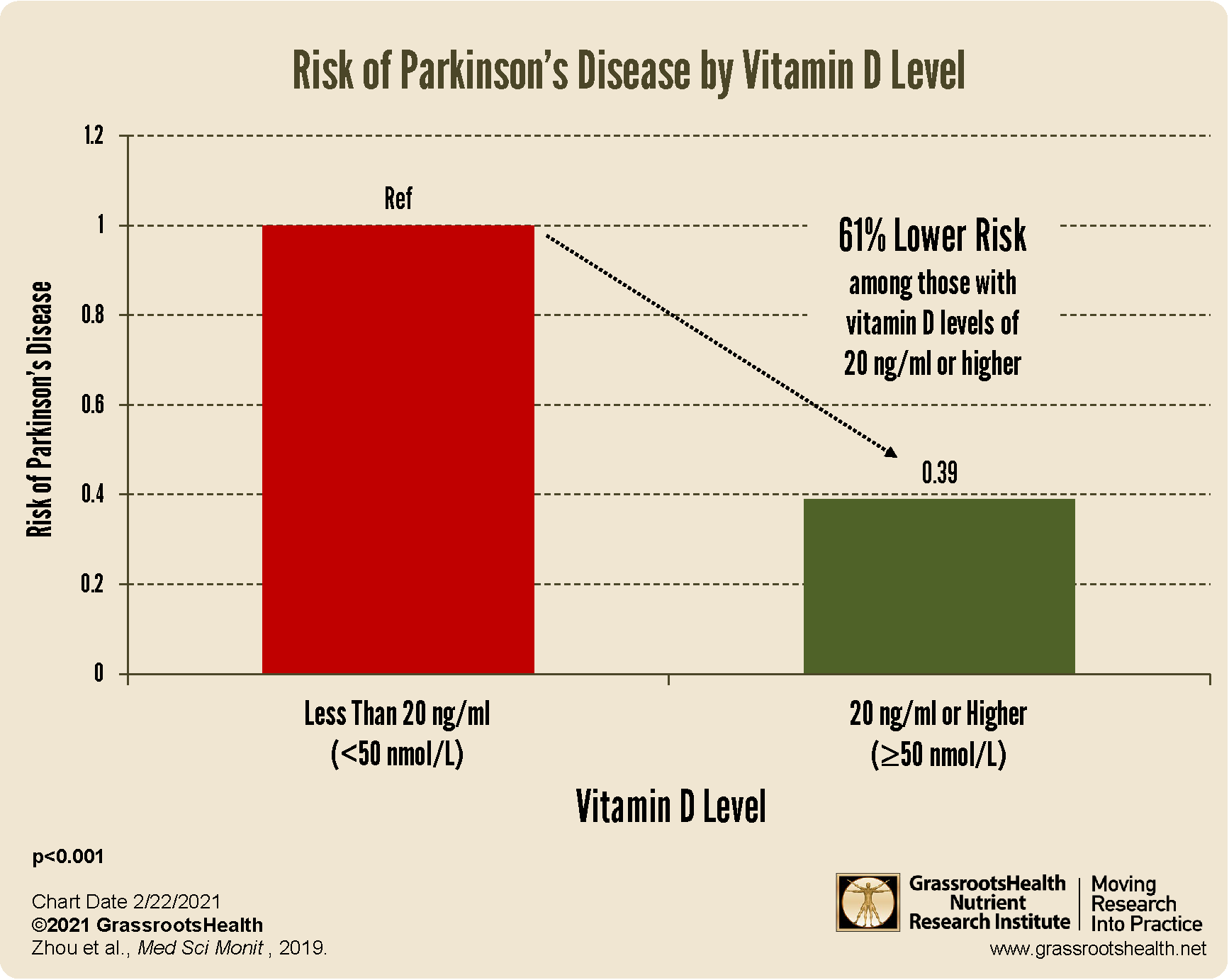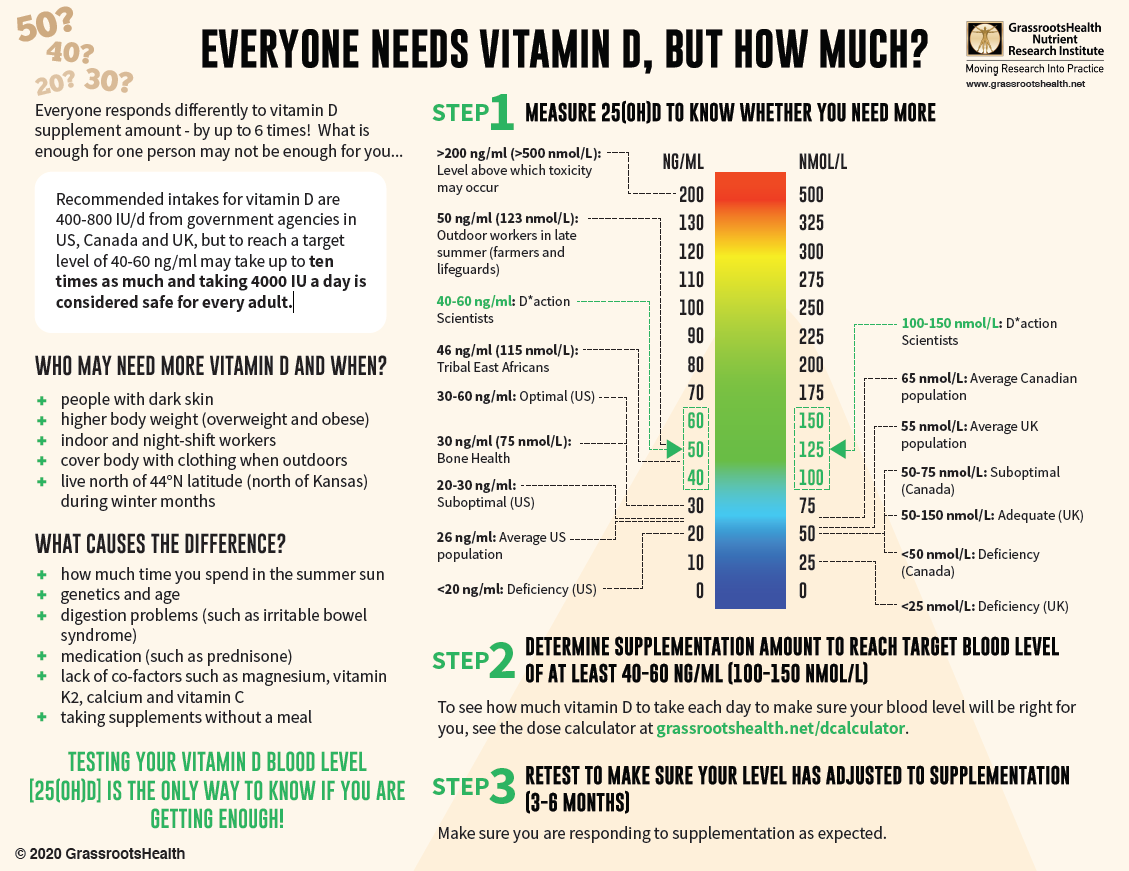Published on February 23, 2021
61% lower risk of Parkinson’s Disease found among individuals whose vitamin D level was 20 ng/ml (50 nmol/L) or higher
 Parkinson’s Disease is a neurodegenerative disease that causes symptoms of motor dysfunction such as resting tremors, slowed movement (bradykinesia), impaired posture and balance, and rigidity, as well as other symptoms that include sleep disturbance, cognitive impairment, olfactory disorders, speech and writing changes, and fatigue. Symptoms usually begin in mid to late life; risk increases with age, and is higher among men compared to women.
Parkinson’s Disease is a neurodegenerative disease that causes symptoms of motor dysfunction such as resting tremors, slowed movement (bradykinesia), impaired posture and balance, and rigidity, as well as other symptoms that include sleep disturbance, cognitive impairment, olfactory disorders, speech and writing changes, and fatigue. Symptoms usually begin in mid to late life; risk increases with age, and is higher among men compared to women.
While there is no cure for Parkinson’s, there are certain medications, therapies, procedures, and lifestyle changes that can help to control symptoms.
Could Vitamin D Help Decrease the Risk of Parkinson’s?
Several, but not all, studies have observed an inverse relationship between vitamin D levels and the risk and severity of Parkinson’s. To help clarify the relationship between vitamin D levels and Parkinson’s Disease risk, Zhou et al. performed a meta-analysis that included data from 8 studies. The authors also looked to see if vitamin D supplementation after diagnosis of Parkinson’s was helpful in improving motor function.
Vitamin D Levels Found to be Significantly Related to Parkinson’s Risk
When the risk of Parkinson’s was compared to vitamin D serum levels, those whose level was below 30 ng/ml (75 nmol/L) had more than a 1.5 fold significantly increased risk of Parkinson’s compared to those with levels of 30 ng/ml or higher (p<0.001). When considering a cut off of 20 ng/ml (50 nmol/L), those with a vitamin D level of less than 20 ng/ml (50 nmol/L) had an almost 2.5 fold increased risk of Parkinson’s compared to those with levels of 20 ng/ml or higher (p<0.001). This translates into a 61% lower risk of Parkinson’s Disease for individuals whose vitamin D level was 20 ng/ml or higher, compared to those with lower levels.
While vitamin D supplementation did increase overall vitamin D levels, this analysis found no significant effect of supplementation on symptoms of motor function.
Make Sure Your Vitamin D Levels Are Not Too Low!
With almost 90% of the general population having vitamin D levels below the recommended 40-60 ng/ml (100-150 nmol/L), it is obvious that most people need more vitamin D. While most of us cannot achieve a vitamin D level of 40-60 ng/ml from sun alone, either due to our lifestyle, where we live, or other circumstances, we can certainly reach those levels with the right amount of supplementation.
Below is a guide for how much you might need, and who may need more. Your levels can be tested safely at home – order your home test kit today.
By joining the GrassrootsHealth projects, you are not only contributing valuable information to our study, but you are also gaining knowledge about how you could improve your own health through measuring and tracking your nutrient status, and educating yourself on how to improve it. Do you know what your status of vitamin D, omega-3s, and other essential nutrients is? Could your levels be improved? Test now to find out!








